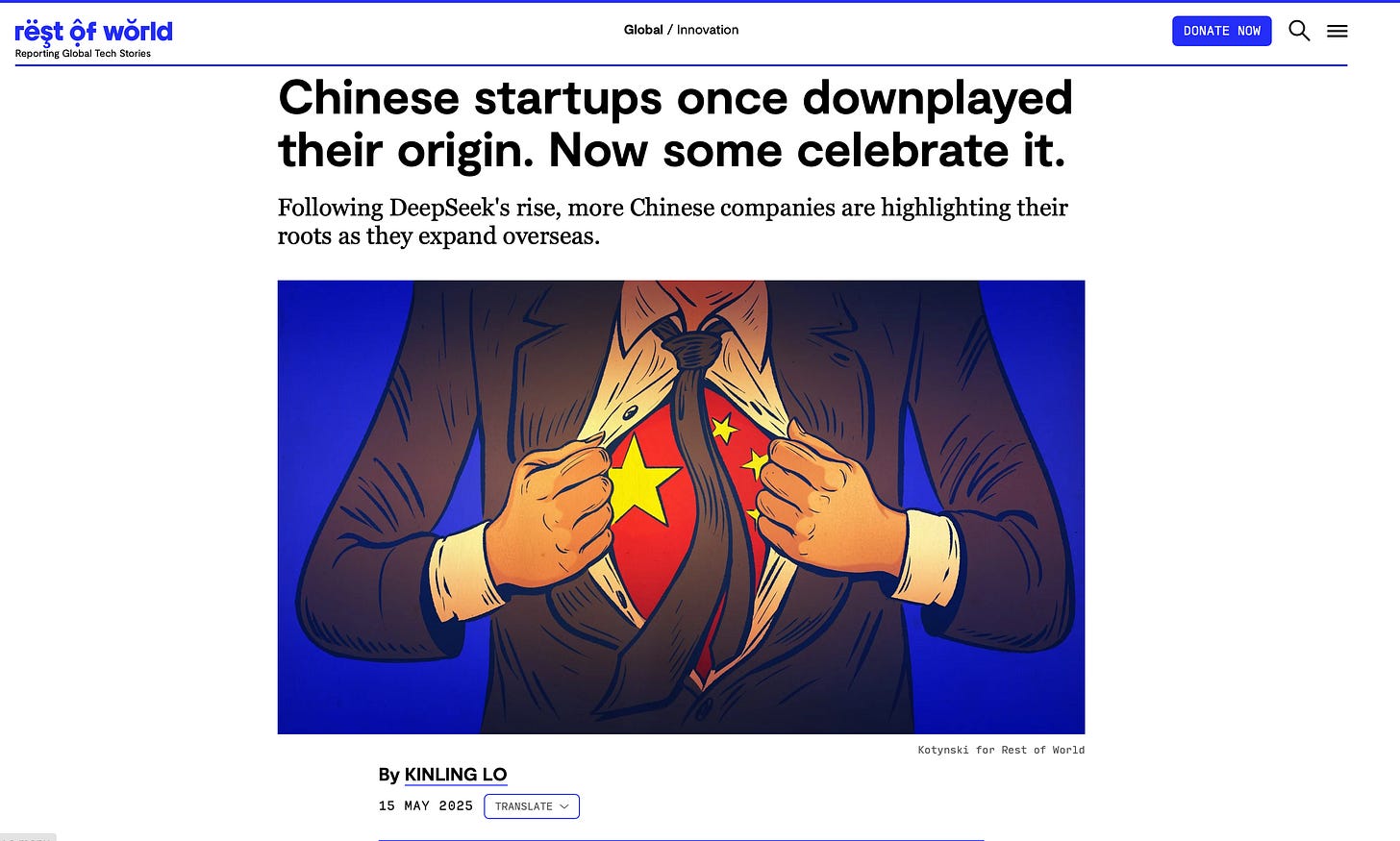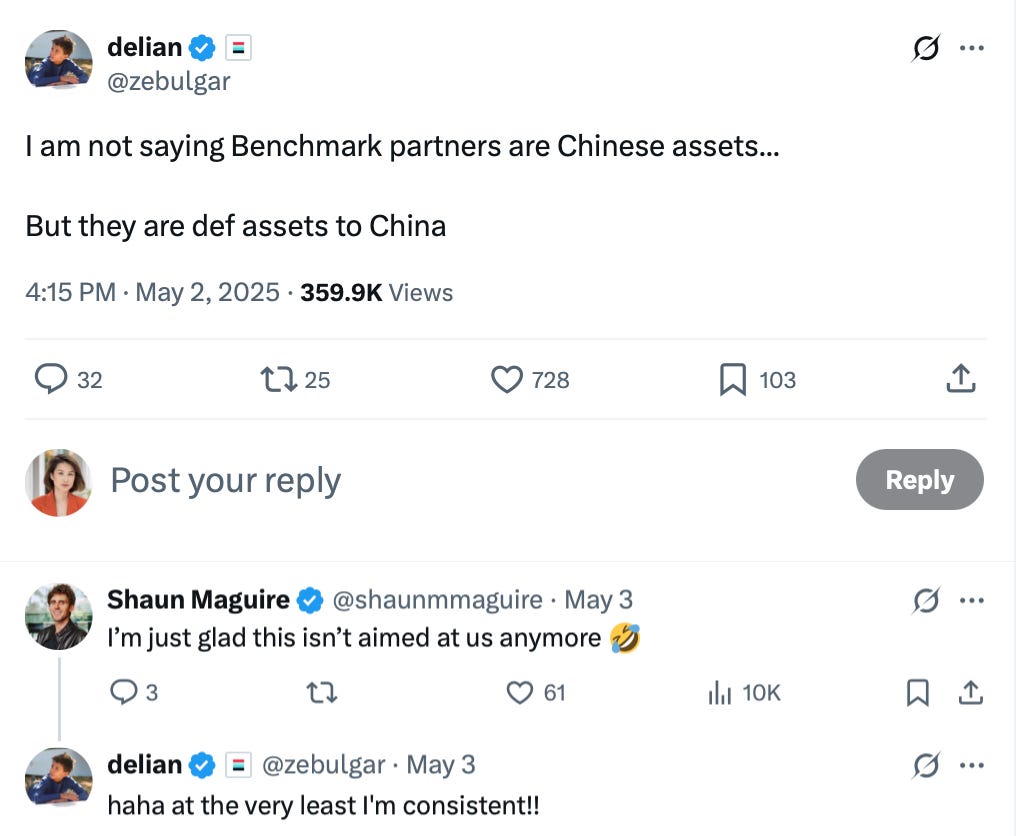The Subtle Persistence of China-Shedding
DeepSeek, Manus, and the uncomfortable truth behind identity, optics, and U.S. capital
Is it finally safe for Chinese startups to stop hiding where they come from?
In a recent Rest of World story, one founder framed it this way:
“DeepSeek has shown us that as long as our product is competitive, we should not worry too much about being a Chinese company.”
But that optimism is still fragile—and perhaps a bit premature.
Even as DeepSeek makes waves, the rest of the ecosystem hasn’t exactly followed.
Recently, Semafor reported that the U.S. Treasury is reviewing Benchmark Capital’s $75 million investment in Manus, an AI company founded by Chinese technologists. Manus is incorporated in the Cayman Islands, stores its data outside China, and has a team that spans Singapore, Japan, the U.S., and China. In other words, it looks like any globally ambitious tech startup. But none of that has stopped the scrutiny.
In fact, the investment sparked public backlash from other VCs.
Was the issue that Benchmark didn’t notify the Treasury Department? Possibly. Benchmark’s legal team reportedly cleared the deal on the thesis that Manus only fine-tunes models. That’s still up for legal debate—the lawyers are at it.
What’s harder to untangle—and more telling—is the deeper perception issue.
Kevin Xu sharply unpacks this dynamic in his Interconnected piece:
“It’s VC math vs. geopolitics math.”
Benchmark may have believed it was early enough to shape the narrative before politics caught up. Instead, the investment became the narrative. And the backlash didn’t come from Capitol Hill—it came from within Silicon Valley itself, from the very ecosystem that’s supposed to reward innovation.
Kevin writes:
“The one risk that may make Benchmark regret this deal is reputational. Touching any Chinese AI startup, seen as a politically toxic asset, as an American investment firm will invite criticism, however baseless. When this deal was reported by Bloomberg, some of Benchmark's competitors quickly accused the firm of helping “the enemy.” Many of these detractors are sadly VC in name only and beltway lobbying firms in reality.”
Which brings us to the unspoken truth many Chinese founders navigating U.S. capital already understand:
It doesn’t matter where your servers are. If you “look Chinese,” you’re still treated as a China risk.
You can register abroad, store your data in a GDPR-compliant fortress, and build a team of ex-Googlers and ex-Meta engineers across six continents. But if your surname, university affiliation, or pitch triggers the wrong instincts, suddenly you’re not just a startup—you’re a geopolitical liability.
Manus likely took a “geopolitical discount” from Benchmark. But the forces at play are more subtle: a stray tweet from a rival VC, a glance in a negotiation, a new round of informal CFIUS reviews. Reputation risk moves faster than regulation.
TikTok CEO’s “Senator, I’m Singaporean” moment continues to echo, just in subtler forms. This isn’t just about politics. It’s about perception. And perception, increasingly, is strategy. Founders now have to manage both their cap table and their national associations with precision. Some rebrand entirely. Others delay fundraising, keep operations offshore, or lean into vague, infrastructure-first narratives that sidestep national identity altogether.
So no, the China-shedding era isn’t over. It’s just become more subtle. It’s less about disavowing identity and more about managing visibility. Some founders embrace ambiguity. Others lean into globalism. A few, like DeepSeek, go all in and hope the product speaks louder than the passport.
If identity is now the front line of industrial policy, then perception becomes strategy.
AI innovation, technical capability, and access to capital are no longer judged solely on performance—they’re judged on optics, associations, and political readability.
In his recent New York Times op-ed, Kyle Chan argues that we may already be living in the Chinese century—and that the early months of Trump’s second term will be remembered as the moment the U.S. definitively lost the plot. While Washington obsesses over tariffs and short-term posturing, China is doubling down on industrial capacity and long-term tech dominance.
The Chinese electric carmaker BYD, which Mr. Trump’s political ally Elon Musk once laughed off as a joke, overtook Tesla last year in global sales, is building new factories around the world and in March reached a market value greater than that of Ford, GM and Volkswagen combined. China is charging ahead in drug discoveries, especially cancer treatments, and installed more industrial robots in 2023 than the rest of the world combined. In semiconductors, the vital commodity of this century and a longtime weak point for China, it is building a self-reliant supply chain led by recent breakthroughs by Huawei. Critically, Chinese strength across these and other overlapping technologies is creating a virtuous cycle in which advances in multiple interlocking sectors reinforce and elevate one another.
Chan’s point is blunt: while the U.S. fixates on symbolic wins, China is engineering real ones. And its model—state-led, long-horizon, and unapologetically strategic—is winning. What’s more, China’s strength in one sector reinforces another: batteries power EVs, which create demand for chips, which in turn fuel AI development. This is not a series of isolated wins; it’s almost like an industrial flywheel.
Against that backdrop, the U.S. focus on identity and political optics isn’t just bad for Chinese founders—it’s bad for brand America.
In today’s WSJ, “Brand America Never Goes Out of Style,” an op-ed by publisher Almar Latour argued that America’s enduring strength lies in its cultural appeal and soft power. But if perception is now doing most of the work—if competitiveness rests more on image than on industrial capability—that only highlights the deeper vulnerability.
When strategic advantage becomes symbolic rather than structural and global innovation is judged through a lens of loyalty rather than merit, the brand may hold up for a while, but the foundation weakens.
And in that scenario, the real risk isn’t who gets funded—it’s who gets shut out.





Consider the amazing diversity of the team developing a major project at wholly american hero OpenAI:
<https://openai.com/index/dall-e-3/>
“Credits
* Core research and execution: Gabriel Goh, James Betker, Li Jing, Aditya Ramesh
* Research contributors—primary: Jim Brooks, Jianfeng Wang, Lindsey Li, Long Ouyang, Juntang Zhuang, Joyce Lee, Prafulla Dhariwal, Casey Chu, Joy Jiao
* Research contributors—secondary: Jong Wook Kim, Alex Nichol, Yang Song, Lijuan Wang, Tao Xu
* Inference optimization: Connor Holmes, Arash Bakhtiari, Umesh Chand, Zhewei Yao, Samyam Rajbhandari, Yuxiong He”
<https://stratechery.com/2025/an-interview-with-nvidia-ceo-jensen-huang-about-chip-controls-ai-factories-and-enterprise-pragmatism/>
“JH: China’s doing fantastic, 50% of the world’s AI researchers are Chinese [...] You walk up and down the aisles of Anthropic or OpenAI or DeepMind, there’s a whole bunch of AI researchers there, and they’re from China.”
Given the tourism data showing a drop in people wanting to come to the US and the recent Newsweek article (https://www.newsweek.com/china-more-favorable-united-states-donald-trump-tariffs-map-nira-data-report-2072059#slideshow/2644198), I am not sure about "Brand America", at least for the next 4 years. That said, last week's Middle East trip may begin to change minds.